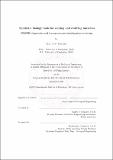Synthetic biology tools for sensing and evolving microbes: CRISPR-diagnostics and transposon-mediated genome re-wiring
Author(s)
English, Max Atti
DownloadThesis PDF (9.056Mb)
Advisor
Collins, James J.
Terms of use
Metadata
Show full item recordAbstract
Mobile genetic elements (MGEs) have played a fundamental role in the evolution of complex organisms, driving innovation through competition, collaboration and co-option. Transposons, in particular, are an ancient family of MGEs whose diverse functions have provided a rich source of DNA-binding and nuclease domains for their cellular hosts, and more recently for biological engineering technologies. In this thesis, I re-purpose transposons and their evolutionary descendants as synthetic biology tools for two distinct applications: new platforms for directed genome evolution, and CRISPR-based nucleic acid sensors. Prokaryotic CRISPR-Cas adaptive immune systems evolved in part from ancestral transposon domains, and the inherent programmability of their RNA-guided nucleases has underpinned their use as specific and sensitive in vitro diagnostics. Here, I present our efforts to expand the use of these CRISPR-based sensors to control the large-scale properties of smart biomaterial systems, and thereby enable programmed cargo release and the development of low-cost, paper-fluidic diagnostic devices. Transitioning to in vivo applications for MGE-derived tools, I describe the development of an engineered, autonomous transposon platform for continuous genome-wide mutagenesis and dynamic regulatory network re-wiring. I use this platform to study the impacts of transposon functionalization on the evolution of parallel E. coli populations towards diverse carbon source utilization and antibiotic resistance phenotypes. Through the implementation of barcode-based tracking and longitudinal next-generation sequencing, I then re-construct transposon lineages within the genomes of host cells and investigate the impact of environmental complexity and genetic contingency on host-transposon interactions. Moving forwards, we envision this directed genome evolution platform being used to discover and optimize strains for biopharmaceutical applications, and as a well-defined testbed to study the role of MGEs in the emergence and re-wiring of complex natural gene regulatory networks.
Date issued
2022-09Department
Massachusetts Institute of Technology. Department of Biological EngineeringPublisher
Massachusetts Institute of Technology